Holiday Blu-ray Movie
HomeHoliday Blu-ray Movie 
includes "Holiday" (1930)Criterion | 1930-1938 | 2 Movies | 96 min | Not rated | Jan 07, 2020
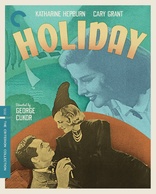
Movie rating
Movie has not been rated yetBlu-ray rating
| Users | 4.0 | |
| Reviewer | 4.0 | |
| Overall | 4.0 |
Overview
Holiday (1930-1938)
An unhappy heiress falls in love with her stodgy sister's freethinking fiancé.
| Romance | 100% |
| Drama | 84% |
| Comedy | 13% |
Specifications
Video
Video codec: MPEG-4 AVC
Video resolution: 1080p
Aspect ratio: 1.37:1
Original aspect ratio: 1.37:1
Audio
English: LPCM Mono (48kHz, 24-bit)
Subtitles
English SDH
Discs
Blu-ray Disc
Single disc (1 BD)
Playback
Region A (locked)
Review
Rating summary
| Movie | 3.5 | |
| Video | 4.5 | |
| Audio | 4.5 | |
| Extras | 4.0 | |
| Overall | 4.0 |
Holiday Blu-ray Movie Review
Reviewed by Dr. Svet Atanasov February 23, 2020George Cukor's "Holiday" (1938) arrives on Blu-ray courtesy of Criterion. The supplemental features on the disc include new filmed discussion between critic Michael Sragow and filmmaker and distributor Michael Schlesinger; excerpt from an audio recording with comments by the director; design sketches; and more. The release also arrives with an illustrated leaflet featuring an essay by critic Dana Stevens and technical credits. In English, with optional English SDH subtitles for the main feature. Region-A "locked".
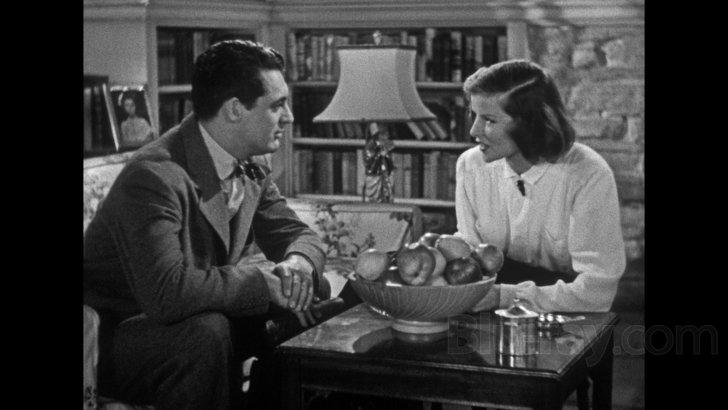
Most people are completely unaware that George Cukor’s film is not the only cinematic adaptation of Philip Barry’s play. Almost a decade earlier, in 1930, Edward H. Griffith was the first to bring the play to the silver screen, and the screenwriter he collaborated with, Horace Jackson, earned an Oscar nomination. Both films are included on this release.
Johnny Case (Cary Grant) has fallen in love with Julia Seton (Doris Nolan) and the two have started planning the next phase of their relationship -- marriage. But Johnny, who comes from a modest family, is completely unaware that Julia is the daughter of one of the wealthiest men in the country, which is why after she brings him home for the first time he experiences something of a cultural shock. The giant portraits on the walls, the impeccably polished floors, and especially the numerous servants running around the lavish home immediately overwhelm him and then make him feel like a stranger in a strange land.
An impromptu encounter with Julia’s sister, Linda (Katherine Hepburn), restores Johnny’s vigor because she immediately warms up to him, and the emergence of her alcoholic brother, Ned (Lew Ayres), actually puts a smile back on this face. But when Linda officially introduces him to her old-fashioned and quite opinionated father, Edward (Henry Kolker), the odd feeling that he has landed in an unfriendly foreign territory instantly returns. The young man then does his best to meet the family expectations, but the harder he works, the more he begins to realize that if he marries Julia he may have to be an actor for the rest of his life.
After plenty of casual but illuminating probing, Johnny earns Edward’s blessing and a plan is made to announce the inevitable glorious wedding that Julia has been fantasizing about during a posh party. But while going over some details and future family activities, Johnny and Julia begin to discover that after all they may not be perfect for each other. Around the same time, Linda also realizes that Johnny might be exactly the type of man she has been hoping to encounter.
At the heart of the film is a clash of contrasting ideas about what makes a life worth living that years ago must have been rather refreshing. Basically, the film effectively questions a series of old clichés about upper class norms and the expectations outsiders like Johnny must meet when they transition to a wealthier environment. Nowadays the most intriguing part the of the narrative is probably the somewhat cynical notion that, among other things, love is also a game that is played by players that are routinely dishonest with each other. While defined by different feelings, the intentions of the two sisters, for instance, create plenty of drama that would have been completely avoided, and at multiple points throughout the film, if they simply acknowledge how they feel about Johnny and the roles he would have in their lives. Obviously, Linda’s desire to support Julia makes everything even more complicated, but a valid case can be made that their ‘dishonesty’ is in fact what fuels their misery.
The finale promotes a predictably ‘correct’ solution of the romantic problem that Johnny and the two sisters are presented with, and for obvious reasons feels just as predictably overly sentimental. However, the buildup before it has some quite hilarious where the stars make the most of the drama.
The 1930 film lacks virtually all of the subtle nuances that make the drama attractive, but it is still engaging and entertaining. However, it is unquestionably a product of its time and its treatment of the original material produces characterizations that are quite formulaic.
Holiday Blu-ray Movie, Video Quality 
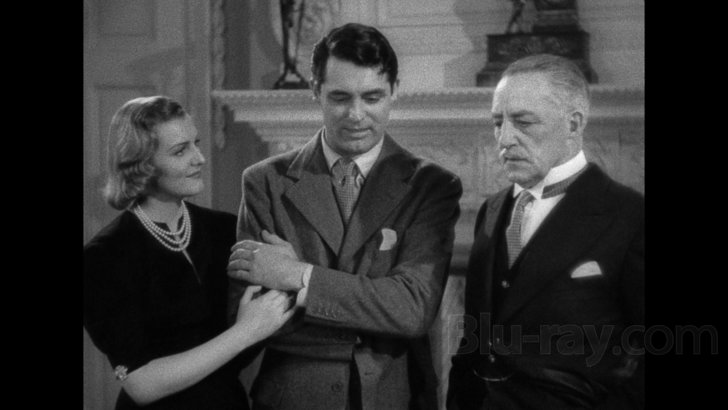
Presented in its original aspect ratio of 1.37:1, encoded with MPEG-4 AVC and granted a 1080p transfer, Holiday arrives on Blu-ray courtesy of Criterion.
The following text appears inside the leaflet that is provided with this Blu-ray release:
"This new digital restoration was undertaken by Sony Pictures Entertainment. A new digital transfer was created at Cineric in New York on the facility's proprietary 4K high-dynamic-range wet-gate film scanner from a 35mm nitrate duplicate negative and a 35mm nitrate print, both preserved by the UCLA Film & Television Archive. The monaural soundtrack was remastered from the original optical soundtrack negative at Burbank, California, under the supervision of Bob Simmons.
Restoration supervisor: Rita Belda/Sony Pictures Entertainment.
Colorist: Sheri Eisenberg/Roundabout Entertainment, Burbank, CA."
The film looks very healthy. There are a few areas where it is rather easy to tell that the visuals a tad 'thicker' than they should be, but these minor fluctuations that are produced by unavoidable source limitations. The rest is great. Clarity and especially depth are actually rather impressive, even on a large screen where limitations are supposedly easier to identify. The grading job is convincing, too. The blacks are solid but never appearing boosted, while the ranges of grays and whites are nicely balanced. Image stability is terrific. Lastly, there are no distracting debris, cuts, damage marks, stains, warped or torn frames to report. (Note: This is a Region-A "locked" Blu-ray release. Therefore, you must have an active Region-A or Region-Free player in order to access its content).
Holiday Blu-ray Movie, Audio Quality 
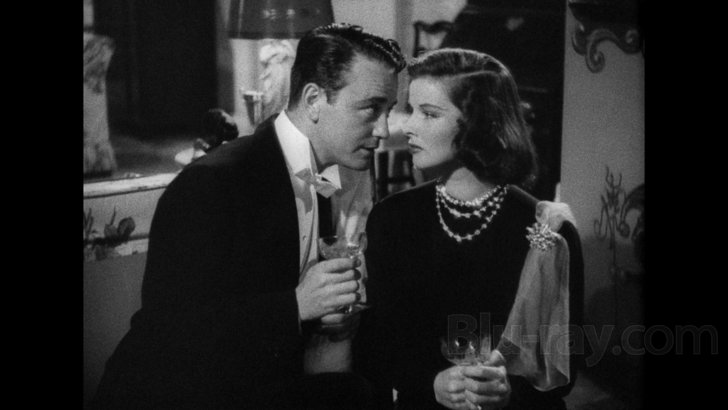
There is only one standard audio tracks on this Blu-ray release: English LPCM 1.0. Optional English SDH subtitle are provided for the main feature.
The audio is clear and stable. If you turn up the volume a bit occasionally some extremely 'thinning' becomes noticeable in the upper register, but there are no troubling hiss or distortions. The dynamic balances is good, though the overall range of nuanced dynamics is predictably limited.
Holiday Blu-ray Movie, Special Features and Extras 
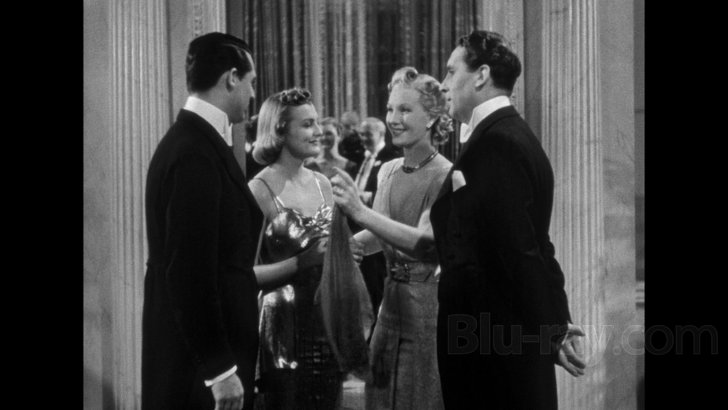
- The 1930 Version - presented here is Edward H. Griffith's 1930 version of Holiday, starring Ann Harding, Mary Astor, and Robert Ames. Remastered. In English, not subtitled. (91 min, 1080p).
- Sragow and Schlesinger - in this new program, critic Michael Sragow and filmmaker and distributor Michael Schlesinger discuss the main differences and similarities between the 1930 and 1938 cinematic adaptations of Philip Barry's play. The program was produced exclusively for Criterion in September 2019. In English, not subtitled. (91 min, 1080p).
- George Cukor - presented here is an audio excerpt from an oral history recorded for the American Film Institute in 1971 and '72 in which director George Cukor discusses Holiday with author and screenwriter Gavin Lambert. In English, not subtitled. (22 min, 1080p).
- Costume Gallery - presented here is a collection of design sketches for various costumes created by Roberto Mero Kalloch III for Holiday. (1080p).
- Leaflet - an illustrated leaflet featuring Dana Stevens' essay "Play Mates" and technical credits.
Holiday Blu-ray Movie, Overall Score and Recommendation 
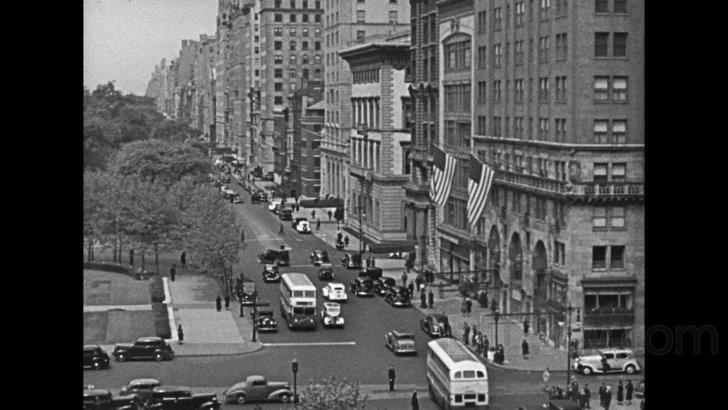
Some of the role playing in George Cukor's Holiday is entertaining, but as far as I am concerned its social messaging cannot be viewed as anything else but awfully dated. I much prefer The Philadelphia Story because the quality of the writing and especially the chemistry on display between Cary Grant and Katharine Hepburn there are vastly superior. This recent release from Criterion also features a very nice remastered presentation of Edward H. Griffith's first cinematic adaptation of Philip Barry's play. RECOMMENDED.